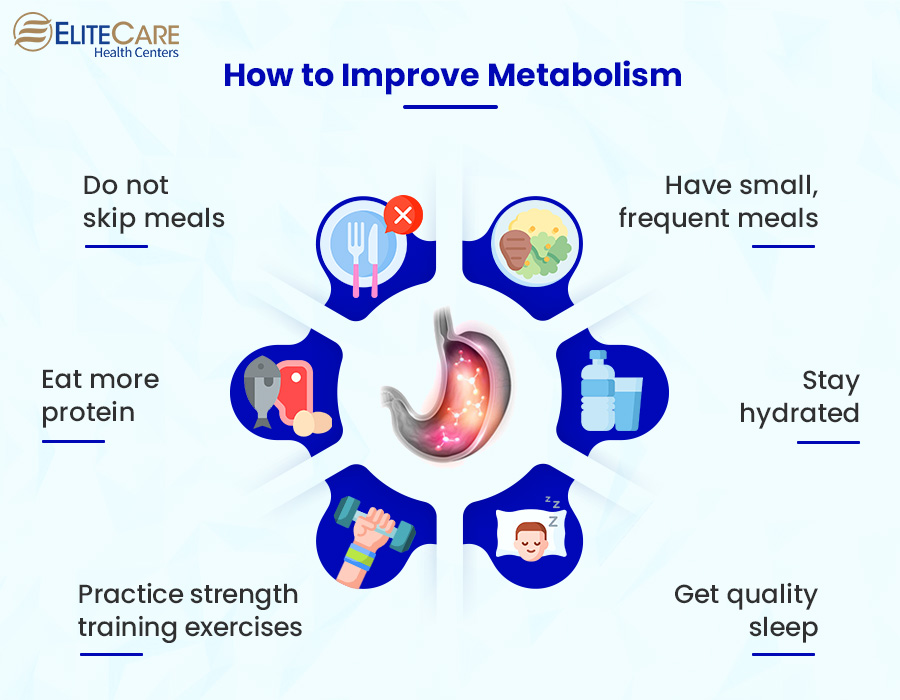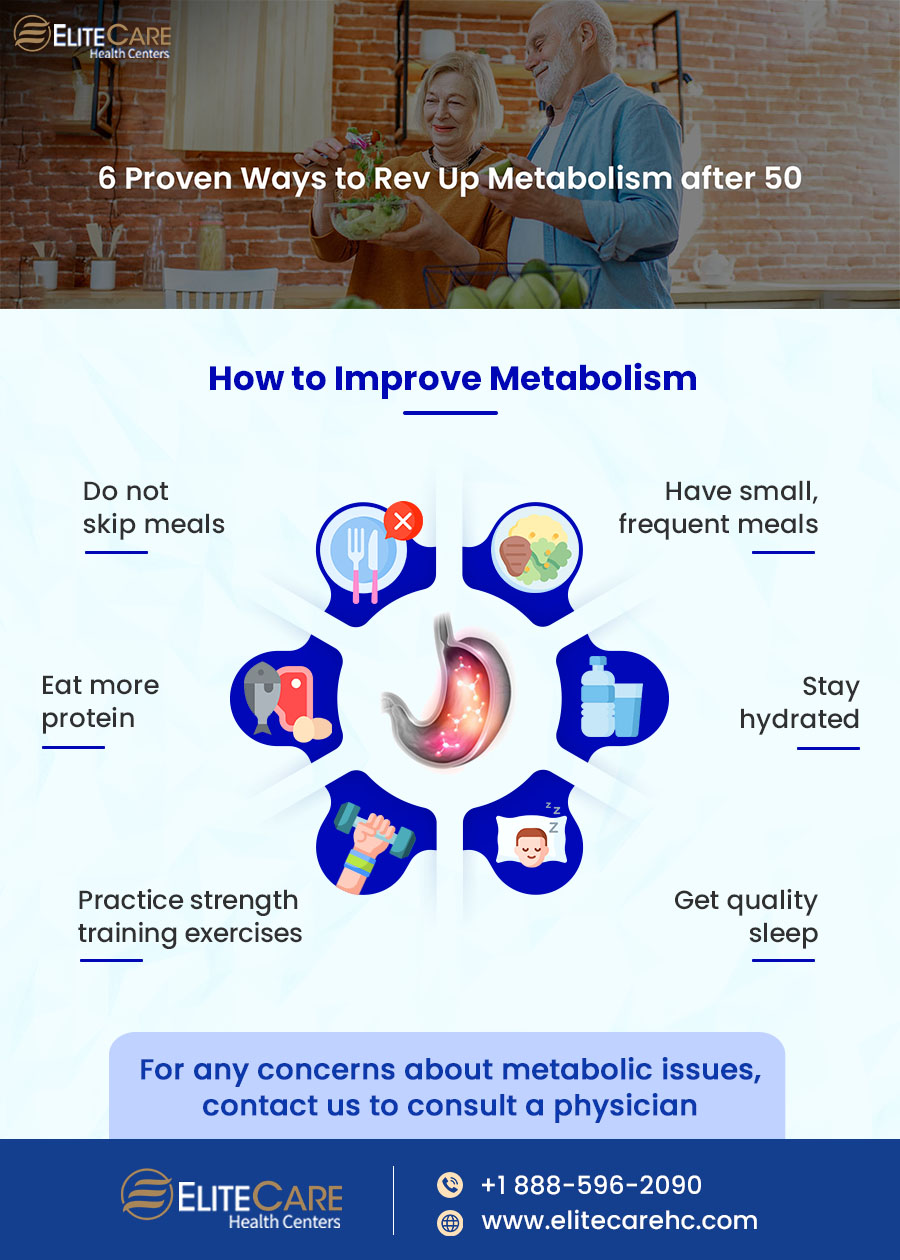
Metabolism refers to the complex chemical processes that help convert food into energy in our bodies. It involves a range of physiological processes, including digestion, respiration, and molecule synthesis that enable our bodies to function optimally.
As we age, our metabolism naturally slows down. As a result, seniors often experience low energy levels, loss of muscle mass, and potentially weight gain. This decline can significantly impact one’s overall well-being, affecting everything from daily activities to the body’s ability to fight illnesses.
In this blog post, we will share a detailed understanding of the body’s metabolism, why it declines with age, and how to boost metabolism naturally with a few healthy lifestyle changes. Read on to learn more.
How Does Age Affect Metabolism?
1. Hormonal changes
Age-related hormonal changes can significantly impact metabolism. For instance, menopause can reduce estrogen levels in women – a hormone that helps maintain lean muscle mass and a higher metabolic rate. With lower estrogen levels, women may experience loss of muscle mass and an increase in body fat, further contributing to a slower metabolism.
Similarly, in men, declining testosterone levels can cause loss of muscle mass and a potential decline in metabolic rate.
2. Decreased physical activity
As we age, factors such as loss of muscle mass and other age-related health conditions may contribute to a more inactive lifestyle. Reduced physical activity means fewer calories burned, which can lead to weight gain and a slower metabolism.
3. Changes in body composition
Age-related changes in body composition, such as increased body fat and loss of muscle mass (also known as sarcopenia), can impact metabolic rate. Fat tissues have a lower metabolic rate compared to muscle tissues. As the proportion of lean muscle decreases in the body with age, the overall metabolic rate decreases as well.
4. Insulin resistance and metabolic disorders
Age can also contribute to insulin resistance, a condition where cells become less responsive to the effects of insulin, resulting in higher blood sugar levels. Insulin resistance can lead to metabolic disorders such as type 2 diabetes and metabolic syndrome, further affecting metabolic function.
How to Boost Metabolism

1. Do not skip meals
Contrary to popular belief, skipping meals is not beneficial for boosting metabolism. When individuals skip meals, their body goes into conservation mode, slowing down their metabolism to store energy. Therefore, it is crucial to eat enough food according to individual body requirements.
2. Change eating habits
As we consume food, our body goes through a process called the thermic effect of food (TEF). This process refers to the energy expenditure required to digest, absorb, and process the nutrients from the food we consume. By eating small, frequent meals, seniors can stimulate the TEF more frequently throughout the day, stimulating the calorie-burning process.
Additionally, seniors should also practice mindful eating and pay close attention to the foods they eat. It not only helps them control their portion but also aids digestion, ultimately supporting a healthy metabolism.
3. Eat more protein
In order to digest protein, our body requires more energy to digest compared to carbohydrates or fats. It means our body burns more calories when it digests protein, resulting in a higher metabolic rate.
Additionally, protein plays a crucial role in building and maintaining lean muscle mass. As muscle tissue is more metabolically active than fat tissue, having more lean muscle mass increases the number of calories burned at rest. By increasing protein intake, individuals can support muscle growth and repair, which in turn boosts metabolism.
Including protein-rich foods such as lean meats, poultry, fish, eggs, legumes, and dairy products in meals and snacks can help enhance metabolism and support overall health.
4. Stay hydrated
Water is involved in numerous metabolic processes in the body, including the breakdown of nutrients. Staying hydrated is essential for optimal digestion and nutrient absorption, which are vital for maintaining a healthy metabolism.
Additionally, studies have shown that drinking water can temporarily increase resting energy expenditure or the number of calories burned at rest. It is known as the thermogenic effect of water.
Due to age-related factors, sometimes seniors may not be able to acknowledge their body’s thirst signals. Therefore, it is crucial to carry a reusable bottle at all times and set reminders to ensure adequate hydration.
5. Practice strength training exercises
Also known as resistance training, strength training exercises are highly effective in increasing metabolism. When we engage in strength training, our muscles are challenged and broken down, leading to muscle repair and growth during recovery. This muscle-building process requires energy, resulting in an increased metabolic rate even at rest.
By incorporating exercises such as resistance band workouts or bodyweight exercises into their routine, seniors can stimulate muscle growth and enhance their metabolism. In addition to strength training, seniors can also incorporate cardio exercises like brisk walking, swimming, or cycling into their routine.
It is crucial to consult a primary care physician and a professional trainer to get the most suitable exercise routine for seniors.
6. Get quality sleep
During sleep, our body undergoes restorative processes, including hormone regulation and tissue repair. Inadequate or poor-quality sleep can disrupt these processes, leading to imbalances in hormones that regulate appetite, metabolism, and energy expenditure. Lack of sleep can also increase the risk of insulin resistance, which negatively affects metabolism.
To ensure sufficient quality sleep, seniors can establish a consistent sleep schedule and create a sleep-friendly environment by keeping the bedroom cool, dark, and quiet. They can also consider practicing relaxation techniques such as deep breathing or meditation before bedtime. Avoiding stimulants like caffeine close to bedtime, limiting screen time, and engaging in regular physical activity can also ensure better sleep quality.
Incorporating these strategies into the lifestyle can help seniors increase their metabolism and promote a healthy, active life. Consult a primary care physician before making any significant changes to their diet or exercise routine to avoid any interference with their pre-existing health issues.
When to See a Doctor
Although there are no exclusive symptoms that may indicate a slower metabolism in seniors, consult a physician if seniors experience the following symptoms:
- Weight gain
- Chronic fatigue and a lack of energy
- Digestive issues, including constipation, bloating, indigestion, etc.
- Increased sensitivity to cold
- Dry skin, brittle nails, and thinning hair
- Muscle weakness
- Joint pain and stiffness
- Irritability
- Memory problems and difficulty concentrating
- Delayed wound healing
- Increased susceptibility to infections and illnesses
For any concerns about senior health and wellness, contact EliteCare Health Care, one of the leading Florida medical clinics that offers a wide range of senior care services.






